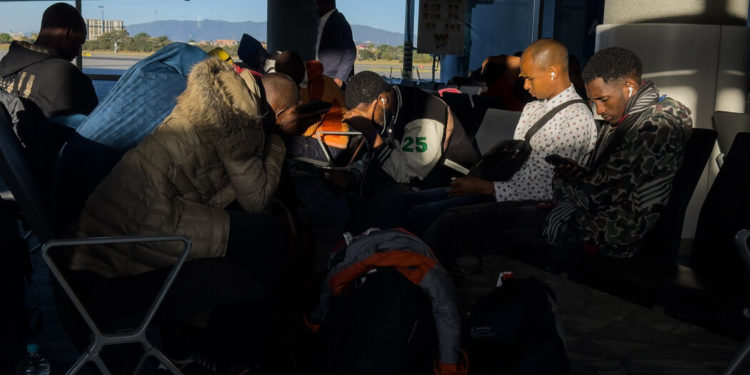By THE NEW YORK TIMES
As record numbers of people cross into the United States, the southern border is not the only place where the migration crisis is playing out.
Nearly three thousand miles to the south, inside Colombia’s main international airport, hundreds of African migrants have been pouring in every day, paying traffickers roughly $10,000 for flight packages they hope will help them reach the United States.
The surge of African migrants in the Bogotá airport, which began last year, is a vivid example of the impact of one of the largest global movements of people in decades and how it is shifting migration patterns.
With some African countries confronting economic crisis and political upheaval, and Europe cracking down on immigration, many more Africans are making the far longer journey to the U.S.
The migrants in Bogotá come mainly from West African countries such as Guinea, Mauritania, Senegal and Sierra Leone, though some are from as far east as Somalia.
They are bound for Nicaragua, the only country in Central America where citizens from many African nations — and from Haiti, Cuba and Venezuela — can enter without a visa. Experts say the country’s president, Daniel Ortega, loosened visa requirements in recent years to compel the United States to lift sanctions on his authoritarian government.
To reach Nicaragua, migrants embark on a journey of several stops, flying to hubs like Istanbul, then on to Colombia, where many fly to El Salvador and then to Nicaragua. (There are no direct flights between Colombia and Nicaragua). Once there, they head northward again, by land, toward Mexico and the U.S. border.
The trip, which has been called by airline employees “the luxury route,’’ bypasses the dangerous jungle pass linking South and North America called the Darién Gap.
Last year, 60,000 Africans entered Mexico on their way to the United States, up from fewer than 7,000 the year before, Mexican authorities reported. (Overall crossings at the Southern border declined at the beginning of this year, but ebbs like those are not uncommon and can be affected by the season and other factors.)
Among those disembarking recently at El Dorado International Airport in Bogotá on a flight from Istanbul was Djelikha Camara, 24, who had studied engineering in Guinea, but said she wanted to leave because a military coup in 2021 had plunged the country into crisis.
She had seen the trans-Atlantic journey advertised on social media, she said, and thought, “I want to try it.”
A daily flight from Istanbul to Bogotá, on Turkish Airlines, has become the most popular route for African migrants trying to reach Nicaragua, airline officials say. But other trans-Atlantic routes — from Spain and Morocco, with stops in Colombia or Brazil — have also boomed. Officials say travel agents in Africa buy tickets in bulk that they resell at a profit.
They advertise online, including in WhatsApp groups like one in Guinea with thousands of members called “Let’s Leave the Country.”
Colombia’s migration director, Carlos Fernando García, said large numbers of Africans began appearing in Bogotá’s airport last spring after the government suspended transit visa requirements for citizens of several African countries to stimulate tourism.
In 2023, more than 56,000 people from Africa transited through Colombia, according to migration data. Authorities would not provide data from previous years but immigrant groups say last year’s figure is a huge increase and fueled primarily by migrants.
While flying is less dangerous than traversing a brutal jungle, migrants at Bogotá’s airport have also faced ordeals.
Some have had to wait for connecting flights scheduled days after they arrived. Others have been stranded after discovering that El Salvador, the next country on their itinerary, charges people from Africa a $1,130 transit fee.
The airport has no beds or showers for migrants. The only food and water is sold at pricey cafes.
There have been flu outbreaks. A woman went into labor. In December, two African children were found in a bathroom after being abandoned by travelers who were not their parents.
Mr. García said airlines were responsible for passengers in the airport between flights, not the government. “It’s private companies that are failing in their duty,” he said, “In their rush to make money, they’re leaving passengers stranded.”
Turkish Airlines did not respond to a request for comment.
Avianca, a Colombian airline that operates several routes used by African migrants headed to Nicaragua, said it was obliged to transport passengers who met travel requirements.
In Bogotá’s airport, migrants are largely kept out of view of other passengers.
Mouhamed Diallo, 40, a journalist who taught university courses in Conakry, Guinea’s capital, said he had spent two days in the arrivals area, before being allowed into the departures section the day of his next flight — to San Salvador, El Salvador.
“I found someone who left yesterday, ” he said. “He had been there 12 days.’’
Many Africans using this route are educated professionals like Mr. Diallo with siblings in the United States and Europe who help pay for their tickets.
Mr. Diallo said he left Guinea because he felt unsafe following the military coup. He is Fulani, the majority ethnic group in the country, and supported an opposition leader who had gone into exile, he said.
“Your leader go out, you go out,’’ he said. “If you don’t, you end up in prison.”
Some migrants have found themselves trapped in the airport.
Kanja Jabbie, a former police officer from Sierra Leone, said he paid $10,000 to travel to Nicaragua. But he learned of the transit fee El Salvador requires only after he arrived in Colombia.
He had no cash, he said, and no way to get it. There is no place to receive wired funds in the terminal, or even an A.T.M.
“I am stuck,” said Mr. Jabbie, 46, who spent three days wandering the terminal, surviving on tea.
The fee, which El Salvador imposed last fall, calling it an “airport improvement fee,” has been a main cause for the backlog of passengers in the Bogotá airport, according to airline officials. Nicaragua also charges a fee, a smaller one, for people from Africa. Neither government responded to a request for comment.
The area around Gate A9, where daily flights leave to San Salvador, is filled with migrants.
People sleep in a corner, or kneel in Muslim prayer, using airplane blankets. Laundry hangs on luggage.
A pregnant woman from Guinea sat at the gate one January afternoon. Asked why she left, she produced a photo showing her face, badly beaten. She pulled back a sleeve to reveal a scar.
“I am here to save my life — my life and my baby. I am hiding from my husband,” said the woman, who asked to to go by only her first initial, T, for her safety. “Hopefully I can reach the U.S.”
She had arrived in Bogotá four days before. Her Avianca flight to El Salvador left that day, but she was bumped off.
“I don’t know why,” she said.
Airport and airline employees who said they were not authorized to speak publicly said passengers sometimes complained about migrants who had not been able to bathe for days.
In response, Avianca’s cabin crew will repeat the company motto: “The sky belongs to everyone.”
Migrants often fall sick after being stuck in close quarters, airline workers said, and some seem fragile. Last spring, on a flight from Madrid to Bogotá, a man from Mauritania died of a heart attack.
Since December, when the two migrant children were left behind in the airport, Colombian authorities have taken a tougher stance.
Airlines are required to verify that children are traveling with adults who are their parents and Colombian authorities are pressing them to permit aboard only people who have a connecting flight within 24 hours.
Migration officers have also started rounding up migrants whose tickets have expired, who linger in the airport for more than a day or who come from a handful of African countries from which Colombia still requires a transit visa. They are putting them on flights back to Istanbul.
Mr. Jabbie, the policeman from Sierra Leone, was among them.
At least one episode turned violent. This month, three women from Cameroon resisted and were dragged screaming through the airport by migration officers and the police and were struck repeatedly with a Taser, they said.
“When we collapse, they put us on the plane,” said Agnes Foncha Malung, 29.
Ms. Malung, who braids hair for a living, decided to leave her homeland with two friends, she said, after some relatives’ homes were burned down amid clashes between English- and French-speaking factions in Cameroon.
The women were held in Bogotá’s airport for several days over what migration authorities told them were visa issues before they were deported.
Ms. Malung, speaking by phone from Cameroon, said the three were sharing a rented room until they figured out their next move.
She said she paid $11,500 for the trip. “It cost me a lot,’’ she said.
Migration authorities did not respond to repeated requests for comment on the incident.
Still, many African migrants have managed to make it to the United States. Mr. Diallo, the journalist, arrived in New York’s La Guardia Airport — his ninth airport in 17 days — on a cold January day.
He had traveled through Central America and Mexico in smugglers’ vehicles, he said, and sat shivering all night in Arizona before he was picked up by the U.S. Border Patrol and requested asylum.
After being released with a date in immigration court, he traveled to the Bronx to join his brother. He has been staying in his cramped apartment, he said, and helping at his convenience store.
Asked if he would send his wife and children on the same route, Mr. Diallo said, “No, never.”
“Never in my life,” he added. “I have traumatism.”
Reporting was contributed by Genevieve Glatsky and Federico Rios from Bogotá, Colombia; Ruth Maclean from Dakar, Senegal; Mady Camara from Conakry, Guinea; and Safak Timur from Istanbul. Simón Posada contributed research from Bogotá.







Discussion about this post